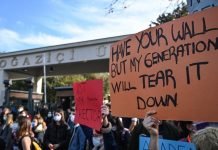Turkey’s rule of emergency was extended on Thursday by three months for the sixth time as Turkish Parliament ratified the bill sent by the Justice and Development Party (AKP) government which is under the strict rule of autocratic President Recep Tayyip Erdoğan.
The ruling AKP and its ally the Nationalist Movement Party (MHP) have voted in favor of the extension, while main opposition Republican People’s Party (CHP) and pro-Kurdish Peoples’ Democratic Party (HDP) voted against. The sixth extension of the rule of emergency will become effective from Friday at 1.00 a.m. The previous vote at the Parliament for an extension was on Oct. 17, 2017.
The rule of emergency was first imposed by Turkish government after a controversial coup attempt on July 15, 2016. The emergency rule was previously extended on Oct. 19, 2016, Jan.19, 2017, April 19, 2017, July 20, 2017 and Oct. 17, 2017.
According to the Turkish Constitution, a rule of emergency can be declared for a maximum period of six months. During the rule of emergency, the cabinet has the right to issue statutory decrees under the president of the republic without regard to routine procedures and restrictions in Article 91 of the constitution. These decrees are first published in the Official Gazette and then submitted to parliament for ratification.
The Constitution requires that in order to enact the rule of emergency, the government must see serious indications of widespread violence that could interfere with Turkey’s democratic environment or its citizens’ basic rights and freedoms as established by the Constitution.
The AKP issued a number of government decrees through which tens of thousands of academics, politicians, teachers, doctors, officials, businessmen, artists and journalists have been purged due to their real or alleged connections to the Gülen movement as well as opponents from liberal and left groups in Turkey.

“The routine extensions of the state of emergency pose significant challenges to the effective protection of human rights, as emergency powers are used to suspend the operation of obligations of the Turkish government,” the UN experts said.
“We remain concerned, as we have since the attempted coup, that the government is taking steps at odds with its obligations under human rights law,” the experts said.
“We are deeply worried about severe crackdowns on civil society, including journalists, the media, human rights defenders, jurists, academics, and civil servants, as well as the use of various powers in ways that are inconsistent with its obligations under the International Covenant on Civil and Political Rights and the European Convention on Human Rights.”
They added, “In any event, emergency powers must be fine tailored to an immediate and urgent crisis and not be used as a means to limit legitimate dissent, protest, belief and opinion, expression and the work of civil society, which in turn risks violating, inter alia, fair trial and due process guarantees, the prohibition of torture and of arbitrary detention and even the right to life.”
Their calls reiterate a statement issued by independent experts in 2016 urging Turkey to adhere to its human rights obligations even in time of declared emergency.
The experts welcomed the decision of the Constitutional Court on Jan. 11 to release two jailed journalists and expressed concern that the criminal courts were not implementing the decision. They hope that the ruling will serve as a precedent for the dozens of other journalists who remain in detention for exercising their right to freedom of expression. They expressed their continued willingness to discuss their concerns with the Turkish authorities with a view to ensuring that emergency measures do not become permanent.
A total of 48,305 people were arrested by courts across Turkey in 2017 over their alleged links to the Gülen movement, said Turkish Interior Minister Süleyman Soylu on Dec. 2, 2018. “The number of detentions is nearly three times higher,” Soylu told a security meeting in İstanbul and claimed that “Even these figures are not enough to reveal the severity of the issue.”
Turkey survived a controversial military coup attempt on July 15, 2016 that killed 249 people. Immediately after the putsch, the Justice and Development Party (AKP) government along with President Erdoğan pinned the blame on the Gülen movement.
Gülen, who inspired the movement, strongly denied having any role in the failed coup and called for an international investigation into it, but President Erdoğan — calling the coup attempt “a gift from God” — and the government initiated a widespread purge aimed at cleansing sympathizers of the movement from within state institutions, dehumanizing its popular figures and putting them in custody.
Turkey has suspended or dismissed more than 150,000 judges, teachers, police and civil servants since July 15. Turkey’s Interior Minister announced on December 12, 2017 that 55,665 people have been arrested. Previously, on December 13, 2017, The Justice Ministry announced that 169,013 people have been the subject of legal proceedings on coup charges since the failed coup.
















